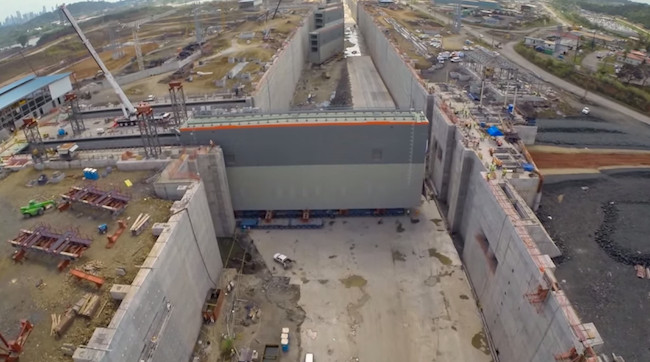In the latest salvo over Panama Canal construction payments, the contractor consortium for the project faces criminal charges in a complaint filed by the vice president of Panama's National Bar Association.
Association VP Juan Carlos Arauz told media service EFE that “we're asking for an investigation into the possible defrauding of the nation's resources” in consortium GUPC's claims of $3.5 billion in cost overruns.

GUPC has complained of delays in the delivery of contractually required payments, and in 2014 the firm pursued arbitration under the rules of the International Chamber of Commerce in a civil case alleging billions of dollars were owed for cost overruns beyond its initial bid of $3.1 billion.
The joint venture was awarded $200 million in January 2015 and an additional $17 million in January 2016 for the claims. In statements regarding his criminal complaint filing, Arauz expressed concern regarding the damage that future arbitration awards might bring to Panama.
In a statement last week, Panamanian President Juan Carlos Varela called on GUPC to focus on the final 4 percent of the project's completion status. “With respect, I am calling on the contractors for the expansion project to hold dialogue with the Panama Canal Authority, to allow work to be completed, to leave legal disputes in the hands of the competent authorities," he said. He added that despite the dispute, the Canal was projected to open in the first half of 2016.
Seven unions representing workers involved with the canal project called for an independent investigation into costs and quality in September. "When we talk about an external inspection and audit of the works, we're referring to one in which those doing the inspecting and auditing do not belong to and are not associated with the [Panama Canal Authority]" they said in a statement, suggesting distrust of both GUPC and the government body. Labor strikes are among the factors cited by media reports for the delay of the canal's opening.

Even before the beginning of the canal's construction, Panamanian authorities questioned whether GUPC's bid was realistic and achievable. The 2010 Wikileaks American diplomatic cable release revealed statements by then-Vice President Varela that GUPC was “very weak” and that he doubted its ability to perform the task. Separately, he told the U.S. consulate's Deputy Chief of Mission that “when one of the bidders makes a bid that is a billion dollars below the next competitor, then something is seriously wrong. Of course I hope for the best, but I’m afraid that [the APC] has made a big mistake.” The next lowest bid in the competition for the Canal's construction was the Bechtel/Taisei/Mitsubishi consortium's $4.2 billion
Panama is no stranger to corruption and funding controversy. Former president Ricardo Martinelli may face corruption charges amidst claims by civil society groups alleging his administration routinely took a 15% cut for government officials on public works projects. A criminal investigation also alleges that his office used wiretaps on political opponents, and the Wikileaks cables suggested that American authorities did not approve of his surveillance activities.
"With all their excesses, the last presidents in Panama cared about appearances," said Ana Matilde Gomez, a former attorney general, adding that Martinelli "didn't even care how it looked.”
Source: maritime-executive.com